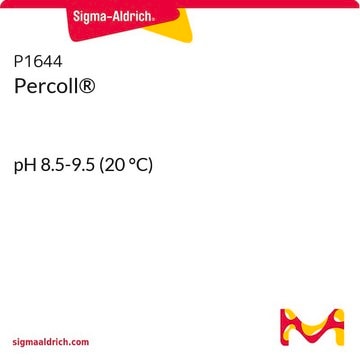P4937
Percoll®
pH 8.5-9.5 (25 °C), suitable for cell culture
Synonym(s):
Density gradient medium
About This Item
Recommended Products
sterility
aseptically filled
Quality Level
technique(s)
cell culture | mammalian: suitable
single cell analysis: suitable
pH
8.5-9.5 (25 °C)
density
1.13 g/mL±0.005 g/mL at 25 °C (lit.)
storage temp.
2-8°C
Looking for similar products? Visit Product Comparison Guide
Related Categories
General description
Application
- neonatal rat ventricular cardiomyocytes
- leucocytes from a blood sample
- peritubular myoid (PM) cells
Features and Benefits
- Low osmolality permits precise adjustment to physiological conditions without significant interference from the medium.
- Compatible with living cells and viruses and allows separation and recovery of intact, fully active systems.
- Impermeable to biological membranes, resulting in no change of buoyant density of particles during centrifugation.
- Spontaneous formation of gradient during centrifugation allows mixing of large sample volumes in the centrifuge tubes.
- Low viscosity results in rapid formation of gradients and particle separation.
- Most biological particles having sedimentation coefficient values greater than 60S can be successfully isolated in Percoll gradients.
Legal Information
related product
Storage Class Code
12 - Non Combustible Liquids
WGK
nwg
Flash Point(F)
Not applicable
Flash Point(C)
Not applicable
Personal Protective Equipment
Certificates of Analysis (COA)
Search for Certificates of Analysis (COA) by entering the products Lot/Batch Number. Lot and Batch Numbers can be found on a product’s label following the words ‘Lot’ or ‘Batch’.
Already Own This Product?
Find documentation for the products that you have recently purchased in the Document Library.
Protocols
To prepare a Percoll gradient, the osmolality of Percoll must be adjusted with saline or cell culture medium to make Percoll isotonic with physiological salt solutions.
Our team of scientists has experience in all areas of research including Life Science, Material Science, Chemical Synthesis, Chromatography, Analytical and many others.
Contact Technical Service







